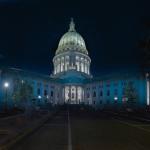Deuteronomy 18:9-22 A Christian’s Response to Halloween
I am beginning a new series I am calling “Seasons.” I will take the next four Sundays to speak from the Bible about four different events which we will come across this month. Today, I am going to speak about a Christian’s Response to Halloween. Next week, I will speak about the Christian and the Election. On November 11, 2012, we will speak about Veterans, and then on November 18, 2012, we will look at what the Bible says about giving thanks.
First, let’s go over a brief review of this secular celebration which people call Halloween.
SLIDE 2: Halloween in Pop Culture
TV Series have used “Halloween” themed episodes dating back to the 1950s. There have been several shows, especially in recent years, glorifying death, and the underworld. The “Twilight” books and movies have promoted vampires as a lifestyle choice.
SLIDE 3: Origins of Halloween
Halloween began two thousand years ago in Ireland, England, and Northern France with the ancient religion of the Celts (Paganism).
SLIDE 4: They celebrated their New Year on November 1st.
This day marked the beginning of the dark, cold winter, a time of year that was often associated with human death. On the night of October 31, they celebrated Samhain, when it was believed that the ghosts of the dead returned to earth.
SLIDE 5: Costumes
People thought that they would encounter ghosts if they left their homes…so they wore costumes so the ghosts would not recognize them
SLIDE 6: The Christian Influence
As the influence of Christianity spread into Celtic lands, in the 7th century, Pope Boniface IV introduced All Saints’ Day, a time to honor saints and martyrs, to replace the Pagan festival of Samhain. It was observed on May 13th.
SLIDE 7: A Change of Date
In 834, Pope Gregory III moved All Saint’s Day from May 13th to Nov. 1st. Oct. 31st thus became All Hallows’ Eve (‘hallow’ means ‘saint’). November 2nd, called All Souls Day, is the day set apart in the Roman Catholic Church for the commemoration of the dead.
SLIDE 8: Trick-or-Treating Began in the 15th Century
During the All Souls Day festival in England, poor people would beg for “soul cakes,” made out of square pieces of bread with currants. Families would give soul cakes in return for a promise to pray for the family’s relatives. The practice, which was referred to as “going a-souling” was eventually taken up by children who would visit the houses in their neighborhood and be given ale, food, and money. Children still go from house-to-house, but instead of ale, food, and money, they get candy.
In 1848, millions of Irish emigrants poured into America as a result of the potato famine. They brought with them their traditions of Halloween. They called Halloween Oidche Shamhna (`Night of Samhain’), as their ancestors had, and kept the traditional observances. This is where the idea of kids going from door-to-door to get candy comes from.
SLIDE 9:
Halloween is a celebration of a foreign pagan religion festival
The day has been used by various groups to practice all of the forms mentioned in Deuteronomy 18:10-11: divination, fortune-telling, interpreting of omens, sorcery, casting spells, consulting mediums, inquiring of the dead. These are similar practices that we see in the Canaanite religion in Deuteronomy. We see culture telling us how to celebrate life. So the question comes, why is it forbidden?
SLIDE 10:
Question: So why are these practices forbidden? (18:9-14)
18:9-14. In these verses, all the forbidden practices—called detestable ways (18:12) of the nations in the land—dealt with either foretelling the future or magic. By the use of magic, one attempted to manipulate or force the “gods” into certain courses of action. Child sacrifice was mentioned here because it was used either as a means of foretelling or as magic to manipulate certain events.
All these practices are forbidden because they divorce life from morality. Several factors make this clear: (1) The future was “determined” by one’s moral behavior, not by magical manipulation. (2) Using magic to manipulate one’s circumstances was, in essence, a futile attempt to flee from the Lord’s ethical laws which promoted life and blessing. (3) The use of magic and divination (18:10, 18:14) was a refusal to acknowledge the sovereignty of the Lord. (4) Reliance on these practices indicated a corresponding failure to trust the Lord with one’s life. People who are knowledgeable of the occult and demon possession quickly point out that the practices mentioned in verses 9-14 have led many into satanic bondage.
Just because everyone’s doing it, it doesn’t mean that God wants you to do it.
Let me share with you two reasons why “just because everyone’s doing it, it doesn’t mean that God wants me to do it.”
Answer: It demonstrates a lack of faith in God to lead my life.
The reason why God finds these methods detestable is that they demonstrate a lack of faith in God. Some things God doesn’t want me to know. For example, God doesn’t tell us when we die. Why not? How would you feel if you knew that fact? Instead, Jesus tells us to only be concerned with today. Today has enough trouble to deal with.
“Therefore don’t worry about tomorrow, because tomorrow will worry about itself. Each day has enough trouble of its own.” (Matthew 6:34, HCSB)
Answer: Some things God doesn’t want me to know apart from Him revealing to me.
“The hidden things belong to the Lord our God, but the revealed things belong to us and our children forever, so that we may follow all the words of this law.”
(Deuteronomy 29:29, HCSB)
God wants you to trust Him. He wants you to follow Him and what He has for you. Which is why God shares a prophecy about the Prophet, beginning in (18:15).
Jesus is the Prophet of Deuteronomy 18.
In Deuteronomy, we have this prophecy about a prophet. Who is this prophet? The Muslims say that this refers to Muhammed. However, when one looks closely at the passage, any Muslim is ruled out. The prophet will come from one of “Israel’s brothers.” This means that the prophet will be an Israelite. Some will say that Jesus never claimed to be the prophet. This objection is answered when one looks with what the New Testament says about Jesus.
Jesus never said directly “I am the prophet of Deuteronomy 18:18.” However, He said that He was a prophet, and probably meant that He was that prophet. Other parts of the New Testament declare Him to be that prophet. Let’s start with Christ’s implications then go on:
Luke 7:39 – the Pharisee said to himself, ‘if this man were a prophet…Jesus knew his thoughts and addressed them, proving to the Pharisee that he was a prophet.
John 5:46 – Jesus said “If you believed Moses, you would believe me, for he (Moses) wrote about me.” Moses did write about Jesus; Jesus is the prophet of Deuteronomy 18:18. Jesus claimed to be the prophet Moses foretold.
In various places, at various times, various people called Jesus the ‘prophet’ of Deuteronomy 18:18, yet Jesus never corrected them, rebuked them, or told them otherwise. He always accepted those particular statements. When the Pharisees called him otherwise, He set them straight. Matt. 21:11, John 1:45, 6:14, 7:40, Luke 7:16, 24:19, etc.
Jesus did call Himself a prophet – John 4:44
After His ascension, His disciples emphatically said He was that prophet: Acts 3:22, 7:37.
SLIDE 11
Anything we do at Halloween, like the Safe House, should be used to point people to Jesus Christ (18:18-19).
While the Bible declares that we should not act like other people who seek other ways to find God’s wisdom, the fact is that people will engage in this behavior whether the church rejects it or not. So instead of crawling in a hole somewhere and cursing the darkness, we need to be people who share the light. This is the main reason why we have this event called the Safe House. Anything we do at Halloween should be used to point people to Jesus Christ.
Notice also that people are accountable for not listening to the prophet (Jesus Christ). Who is accountable? Sinners are accountable when they don’t listen to Jesus.
“I will hold accountable whoever does not listen to My words that he speaks in My name.” (Deuteronomy 18:19, HCSB)
How can we make them accountable if we don’t share the message of Jesus?
“For everyone who calls on the name of the Lord will be saved. But how can they call on Him they have not believed in? And how can they believe without hearing about Him? And how can they hear without a preacher?” (Romans 10:13–14, HCSB)
So we take this time to pray for the Safe House. We take this time to dedicate it to God’s purposes. We take this time to commit to helping with the Safe House. Why? Because people need Jesus. We need to point people to Him.














